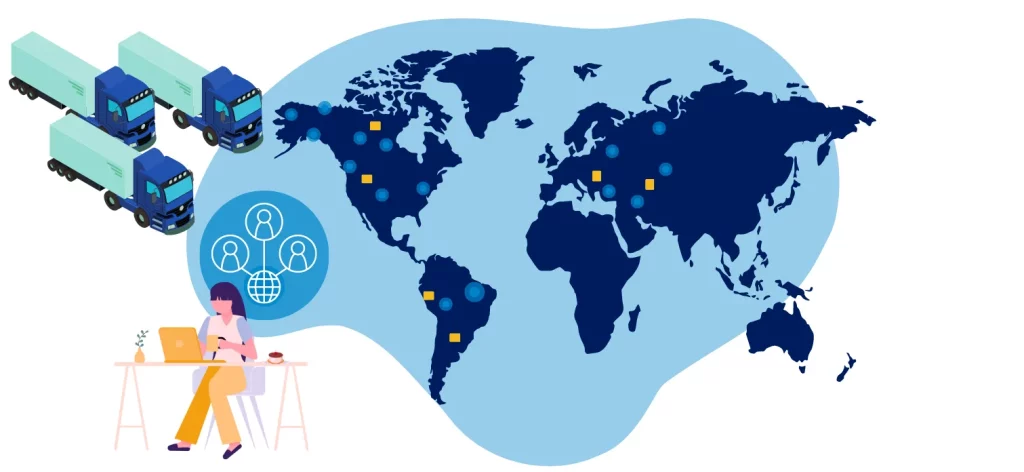The logistics and transportation business is undergoing a seismic change that will reshape its operational landscape between 2023 and 2024. What’s the game-changer? TMS stands for Transportation Management System.
This cutting-edge technology, which is rapidly gaining traction among manufacturers, wholesalers, and retailers, is revolutionizing freight logistics management in ways that were inconceivable just a few years ago.
Understanding the Shift towards Transport Management Software
Transport Management Software (TMS), a critical component of supply chain management, is a digital system that provides a clear overview, booking execution, and carrier selection optimization for physical product movement. Businesses in the manufacturing, wholesale, and retail sectors are finding increased efficiency, lower costs, and greater customer service by incorporating TMS into their operations.
The adoption of Transportation Management Software is a recent trend. The global transport management systems market was valued at USD 10.45 billion in 2022 and is anticipated to reach USD 30.18 billion by 2030.
As a result, the compound annual growth rate (CAGR) will be 14.8% from 2023 to 2030 (source: Grand View Research, Inc.). This rapid growth reflects the growing recognition of TMS’s potential for change in the transportation and logistics industries.
What is transportation management?
Transportation management is the systematic planning, implementation, and optimization of shipping commodities and freight movement. Its functions include identifying acceptable forms of transportation, routing, scheduling, carrier selection, load planning, execution, goods auditing, payment, and performance monitoring.
Transportation management guarantees that deliveries are made efficiently, cost-effectively, and on time. This entails coordinating all parties involved in transportation, including shippers, carriers, suppliers, and customers.
What are the advantages of transport management software?
Transportation management software is transforming transportation operations in terms of timely, dependable, and cost-effective shipment. TMS provides diverse solutions for transporting goods across numerous modes, whether domestically or globally, using company-owned or third-party resources inside the TMS framework, in addition to multimodal transport. Transportation management software can handle a wide range of freight, from small packages to large bulk shipments.
1. Increased operational efficiency
One of the most visible changes brought about by TMS is an increase in operational efficiency. Transport Management Software for Shippers provides an overview, pricing, transit time, and CO2 emissions comparison in carrier selection, as well as automates alerts to suppliers and customers, eliminating human activities and freight expenses. Furthermore, by automating time-consuming manual operations, TMS allows logistics teams to focus on strategic, value-added activities.
2. Data-Informed Decision Making
TMS solutions include advanced analytics capabilities, allowing businesses to gain valuable insights from their logistics data. Businesses can make data-driven decisions, improve operational effectiveness, and forecast demand more accurately by analyzing trends and patterns.

3. Sustainability
TMS assists businesses in reducing their carbon footprint in the face of growing environmental concerns. TMS helps to make greener logistics decisions by providing pre-calculated CO2 emission estimates before booking transportation.
4. Transparency and visibility have increased
Customers expect real-time tracking and clear order milestones in the age of e-commerce and same-day delivery. TMS improves visibility from start to finish by delivering real-time updates on shipment status from dispatch to delivery. This greater transparency builds confidence and increases client happiness.
5. Improved client satisfaction
Customers today expect fast delivery, customized delivery timeframes, and the ability to make last-minute modifications. Modern transportation management software may match these expectations by connecting order management and warehousing systems, allowing the selection of the most cost-effective carrier, and benefiting both customers and enterprises.
6. Increased warehouse productivity
A TMS saves time on freight management and improves warehouse efficiency. Integrating technologies such as ERP reduces errors, and combining it with a Warehouse Management System and a Supply Chain Visibility Solution can further decrease expenses and boost efficiency.
What Will Happen in 2023/2024?
The adoption of Transport Management Software shows no signs of diminishing. As we approach 2024, we anticipate seeing more advanced capabilities integrated into TMS, such as AI-driven predictive analytics, IoT connectivity, and the growing usage of blockchain for secure, transparent transactions. The ramifications of these breakthroughs will be far-reaching, affecting not only the transportation industry but also the larger supply chain ecology. With the digital transformation of logistics well underway, organizations that leverage the power of TMS for shippers will undoubtedly have a considerable competitive edge.
The Bottom Line
To summarize, the emergence of Transport Management Software in 2023/2024 signifies a paradigm shift in the logistics and transportation industries. TMS is the future of freight logistics management because it improves efficiency, transparency, data-driven decisions, and sustainability. Companies that accept and adapt to this technology will set the benchmark for innovative, customer-centric, and sustainable operations.